Every Child Ready (ECR) is an evidence-based, comprehensive PK instructional model that helps children develop and maintain a deep love of learning and prepare for kindergarten. It is rooted in seven guiding principles that shape children’s experiences , as well as the structures and decision-making that support implementation. Guiding Design Principles The ECR curriculum is built to be developmentally appropriate and diverse. It includes engaging thematic units with separate content for 3- and 4-year-olds, and it provides children with the opportunity to engage in multiple types of play while learning core academic concepts and developing social-emotional learning skills. It also supports concept development and rich vocabularies in young children.
The model is customizable to different contexts and is currently in four states across the country. It has demonstrated a range of positive impacts on children’s math and literacy skills as well as teacher performance. The model also provides various implementation supports to schools—including coaching, professional workshops, and digital resources—all aimed at ensuring that the school and classroom environment are equipped to successfully implement ECR.
What Makes This Model Innovative?
Whole-Child Focus
High Expectations with Unlimited Opportunities
Customization
Goals
Every Child Ready aligns to evidence-based early learning standards by addressing four key learning domains. ECR has a flexible delivery model to meet the needs of each school, classroom, and learner, ensuring that these domains of learning are fully supported.
Literacy
Children learn essential phonological awareness skills such as phoneme blending, compound word elision, and rhyme awareness.
Language
Children practice and gain expressive language and narrative comprehension skills.
Math
Children discover essential number concepts and early math skill areas such as number identification and counting, geometry and spatial sense, patterning, classification, and measurement.
Social-Emotional Learning
Children develop broad social-emotional skills including self-regulation, attachment, initiative, and self- and social awareness.
Experience
 In the Every Child Ready model, children engage in a variety of activities that support their academic and social-emotional development. These activities—referred to as the Daily Learning Components—create variety in a child’s day, yet they are consistent over time in providing children with a predictable yet varied experience. Daily components include elements of play to engage children in learning, rigorously supporting their learning through thematic units and learning domains. The incorporation of purposeful play in the daily components allows teachers to utilize differentiated instruction to customize for individual child needs.
In the Every Child Ready model, children engage in a variety of activities that support their academic and social-emotional development. These activities—referred to as the Daily Learning Components—create variety in a child’s day, yet they are consistent over time in providing children with a predictable yet varied experience. Daily components include elements of play to engage children in learning, rigorously supporting their learning through thematic units and learning domains. The incorporation of purposeful play in the daily components allows teachers to utilize differentiated instruction to customize for individual child needs.
Playful learning is at the heart of children’s experience of the model. The Every Child Ready model includes varied opportunities for three types of play: structured, pretend, and physical play. Each type of play provides young learners with unique experiences that support growth and make learning fun:
 Structured Play: This includes any playful guided activities, like puzzles, art, and some STEM exploration.
Structured Play: This includes any playful guided activities, like puzzles, art, and some STEM exploration. - Pretend Play: A child-guided play with role- and perspective-taking, representational thinking, and lots of expression!
- Physical Play: Either teacher-guided exercises or child-directed rough and tumble play. This is incorporated into daily lessons through gross motor time, the morning meeting, and outdoor play.
These forms of play are woven into the daily learning components children experience as part of the ECR model, giving children ample opportunity to explore and learn through play.
The lessons and routines included in the Every Child Ready model are designed to set the stage for effective teacher-child interactions. They include eight components that are scheduled throughout the day. Each one incorporates one or more of the three playful learning strategies and addresses the thematic units and learning domains. These components that make up the balanced schedule are:
- Morning Meeting: Children are welcomed by peers and teachers. Teachers set the tone for the day with community-building, a quick and clear overview of the concepts and activities that will be explored during the lesson, and focused attention on one standards-based skill.
- Centers Meeting and Centers: Centers are free-choice learning areas focused on unit themes; activities allow children to apply the concepts learned in other parts of the day through hands-on learning and authentic interactions with their peers and teachers. Centers time begins with a Centers Meeting—where all the available centers are introduced and modeled in a way that draws attention to prosocial behavior or pre-corrections, transitioning children to Centers. During Centers, playful and engaging activities can support children across multiple domains of learning, including cognitive, physical, social, and emotional. Teacher(s) facilitate free-choice learning Centers using a variety of strategies, such as modeling, coaching, and questioning. ECR recommends having Centers twice each day. Centers can also include time for intervention support. For example, teachers can use the last 15-30 minutes of Centers for a variety of tiered intervention supports.
 Small Groups: Small Groups are 8-12 minute lessons for target skills that take place two times each day. Teachers typically conduct small groups during Free Choice Centers. Lessons use modeling, guided practice, and checks for understanding. ECR includes two types of Small Groups: traditional and flexible. Traditional Small Group lessons are used to teach targeted science and social studies content, and Flexible Small Groups (FSGs) align with the ECR Essential Standards. FSG plans provide teachers with instructional materials for targeted math, language, literacy, and social-emotional learning instruction. Teachers use data to decide where children are in their learning of discrete competencies. Each plan is designed to be differentiated and informally assessed to meet the needs of each child. Teachers may pace lessons based on children’s day-to-day performance.
Small Groups: Small Groups are 8-12 minute lessons for target skills that take place two times each day. Teachers typically conduct small groups during Free Choice Centers. Lessons use modeling, guided practice, and checks for understanding. ECR includes two types of Small Groups: traditional and flexible. Traditional Small Group lessons are used to teach targeted science and social studies content, and Flexible Small Groups (FSGs) align with the ECR Essential Standards. FSG plans provide teachers with instructional materials for targeted math, language, literacy, and social-emotional learning instruction. Teachers use data to decide where children are in their learning of discrete competencies. Each plan is designed to be differentiated and informally assessed to meet the needs of each child. Teachers may pace lessons based on children’s day-to-day performance.- Read Aloud: Read Alouds happen twice each day. Morning Read Alouds focus on math and social-emotional learning books. Afternoon Read Alouds focus on narrative fiction and nonfiction books. As a book-based, thematic curriculum, ECR Read Aloud lessons anchor children’s learning throughout the unit. The Read Aloud emphasizes teacher-child interactions to support language development, critical thinking, and problem-solving. Teachers read thematic books multiple times to build children’s content knowledge and understanding of different lesson objectives. All Read Aloud lessons articulate core academic vocabulary and offer guidance before, during, and after the reading to maximize learning.
- Journaling: Dedicated time for written expression based on a theme-related prompt. This component includes modeling, conferencing, and Author’s Chair, where a child shares their writing out loud to their peers. Children express their thoughts and ideas through writing and drawing at their own pace. Teachers coach and conference with several children as they write and draw. Teachers highlight the work of one child per day by facilitating the Author’s Chair and encouraging peer questions and discussions.
- Question of the Day: Question of the Day is a brief component in which children share their thoughts, ideas, and opinions to a daily question related to a thematic topic. Within the lesson, the daily question integrates a skill with a thematic unit topic, such as interpreting and discussing a bar graph of how each child arrived at school. While the component is short, children can continue to give responses throughout the day.
- Learning Lab: Learning Lab explores science and engineering content, while reinforcing the eight habits of mind (STEM) practices. Children observe, explore, construct, and experiment through daily hands-on STEM activities. Lessons include explicit opportunities for applied social-emotional learning and writing. ECR STEM Practices
- Gross Motor: Gross Motor supports balance, coordination, and social-emotional learning through movement and games. Children participate in physical play that supports gross motor development and social-emotional learning, such as turn-taking and managing small frustrations. Children often receive opportunities to lead lessons or choose gross motor activities. This physical activity occurs in addition to outdoor play.
Supporting Structures
The Every Child Ready model can be adapted to support children across a range of contexts. Scheduling is flexible and customizable so that it can fit into a variety of school-day programs for PK children.
Schools must use the ECR thematic curriculum to implement the model.
The 10 thematic units of study are rich, playful, and engaging. These include themes such as Family and Community, Culture, Healthy Bodies, and the Animal Kingdom, among others. The curriculum covers two years, with unique content for PK3 and PK4 classrooms. Each four-week thematic unit uses: essential questions; high-quality, diverse children’s literature; core vocabulary; prefilled weekly lesson grids; scripted lessons for each component of the day; engaging reproducibles; picture-word cards; and posters
While the use of the thematic curriculum is required to implement the model, teachers can customize it to meet each student’s needs. They have the autonomy to decide how the curriculum will be used, how closely lessons will be followed, and which components and units are most useful. ECR Curriculum Sample
The ECR assessment program incorporates formal and informal assessment to support children’s learning. Formal assessment incorporates three direct assessments of children’s early math, language, and literacy skills and one teacher report measure for social-emotional learning skills. Informal assessment incorporates a suite of formative direct assessment, observational assessment, and teacher report data to provide teachers with actionable reporting that supports meaningful learning experiences for all children. Together, the ECR assessment program covers essential standards of learning and is used to monitor children’s progress through multiple domains of learning throughout the year. These tools are an integrated part of the instructional model, and educators can choose to use all four assessments or select the ones that work best for their school’s needs. ECR Reliable & Valid Tools
ECR recommends teachers and leaders participate in coaching to support successful implementation of the model.
 Though not required, ECR strongly recommends leaders in their first year of implementation participate in coaching. To prepare teachers and leaders for the classroom, ECR offers optional coaching for both early childhood pedagogy and implementation of the ECR model. Schools can opt to have classroom coaching from ECR specialists, or school leaders can use ECR resources to coach and support on their own. Teachers should support children’s development across a range of competencies. High-quality and responsive teaching requires ongoing professional development and dedicated time to planning and reflection.
Though not required, ECR strongly recommends leaders in their first year of implementation participate in coaching. To prepare teachers and leaders for the classroom, ECR offers optional coaching for both early childhood pedagogy and implementation of the ECR model. Schools can opt to have classroom coaching from ECR specialists, or school leaders can use ECR resources to coach and support on their own. Teachers should support children’s development across a range of competencies. High-quality and responsive teaching requires ongoing professional development and dedicated time to planning and reflection.
While there are required ECR daily components, schedules can be customized to meet the needs of each school.
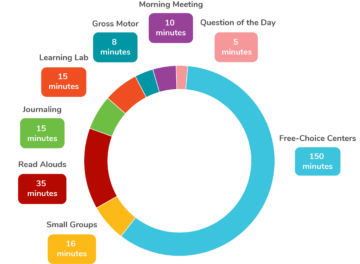 While ECR can be implemented in many ways, the daily schedule must provide balanced opportunities for children to learn in small groups, as a whole group, and individually. Schools can customize their schedules by selecting components and time lengths within the ECR Platform. ECR Schedule and Components
While ECR can be implemented in many ways, the daily schedule must provide balanced opportunities for children to learn in small groups, as a whole group, and individually. Schools can customize their schedules by selecting components and time lengths within the ECR Platform. ECR Schedule and Components
Schools must engage and educate families to reinforce learning at home.
ECR recognizes families as critical partners in supporting student learning. As such, they provide various resources so families know what their children are learning at school and can extend learning at home. Family engagement resources include:
- Unit letters that explain to families the current unit’s theme and provide suggested activities families can try at home. Sample Unit Letter
- Quarterly Child Progress reports that provide families a snapshot of the child’s progress across the standards that they’re learning.
- ECR @ Home family packets with weekly at-home activities aligned with each thematic unit. Sample ECR @ Home Unit
- ECR digital books and the ECR YouTube Channel, which include read alouds, science lessons, and parent videos. ECR Family Resources
Classrooms must have learning centers intentionally designed to support developmentally appropriate, multi-model learning.
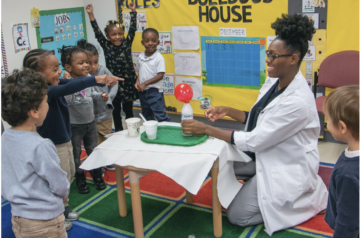 All ECR classrooms foster engagement and play by creating eight learning centers: Art Studio, Art Easel, Construction Zone, Dramatic Play, Exploration Station, Investigation Location, Library, and Writing. These eight learning centers provide the backbone for a hands-on environment in which children can explore with their senses and expression to learn about the world around them. Every Child Ready Centers
All ECR classrooms foster engagement and play by creating eight learning centers: Art Studio, Art Easel, Construction Zone, Dramatic Play, Exploration Station, Investigation Location, Library, and Writing. These eight learning centers provide the backbone for a hands-on environment in which children can explore with their senses and expression to learn about the world around them. Every Child Ready Centers
The ECR Platform is integral to customizing instruction to meet the needs of all learners.
The ECR Platform is designed to be a one-stop shop for teachers and leaders implementing the model. The platform allows them to easily customize the daily schedule, plan differentiated lessons, manage individual child progress, and even participate in professional learning.
Schools must use the ECR thematic curriculum to implement the model.
The 10 thematic units of study are rich, playful, and engaging. These include themes such as Family and Community, Culture, Healthy Bodies, and the Animal Kingdom, among others. The curriculum covers two years, with unique content for PK3 and PK4 classrooms. Each four-week thematic unit uses: essential questions; high-quality, diverse children’s literature; core vocabulary; prefilled weekly lesson grids; scripted lessons for each component of the day; engaging reproducibles; picture-word cards; and posters
While the use of the thematic curriculum is required to implement the model, teachers can customize it to meet each student’s needs. They have the autonomy to decide how the curriculum will be used, how closely lessons will be followed, and which components and units are most useful. ECR Curriculum Sample
The ECR assessment program incorporates formal and informal assessment to support children’s learning. Formal assessment incorporates three direct assessments of children’s early math, language, and literacy skills and one teacher report measure for social-emotional learning skills. Informal assessment incorporates a suite of formative direct assessment, observational assessment, and teacher report data to provide teachers with actionable reporting that supports meaningful learning experiences for all children. Together, the ECR assessment program covers essential standards of learning and is used to monitor children’s progress through multiple domains of learning throughout the year. These tools are an integrated part of the instructional model, and educators can choose to use all four assessments or select the ones that work best for their school’s needs. ECR Reliable & Valid Tools
ECR recommends teachers and leaders participate in coaching to support successful implementation of the model.
 Though not required, ECR strongly recommends leaders in their first year of implementation participate in coaching. To prepare teachers and leaders for the classroom, ECR offers optional coaching for both early childhood pedagogy and implementation of the ECR model. Schools can opt to have classroom coaching from ECR specialists, or school leaders can use ECR resources to coach and support on their own. Teachers should support children’s development across a range of competencies. High-quality and responsive teaching requires ongoing professional development and dedicated time to planning and reflection.
Though not required, ECR strongly recommends leaders in their first year of implementation participate in coaching. To prepare teachers and leaders for the classroom, ECR offers optional coaching for both early childhood pedagogy and implementation of the ECR model. Schools can opt to have classroom coaching from ECR specialists, or school leaders can use ECR resources to coach and support on their own. Teachers should support children’s development across a range of competencies. High-quality and responsive teaching requires ongoing professional development and dedicated time to planning and reflection.
While there are required ECR daily components, schedules can be customized to meet the needs of each school.
 While ECR can be implemented in many ways, the daily schedule must provide balanced opportunities for children to learn in small groups, as a whole group, and individually. Schools can customize their schedules by selecting components and time lengths within the ECR Platform. ECR Schedule and Components
While ECR can be implemented in many ways, the daily schedule must provide balanced opportunities for children to learn in small groups, as a whole group, and individually. Schools can customize their schedules by selecting components and time lengths within the ECR Platform. ECR Schedule and Components
Schools must engage and educate families to reinforce learning at home.
ECR recognizes families as critical partners in supporting student learning. As such, they provide various resources so families know what their children are learning at school and can extend learning at home. Family engagement resources include:
- Unit letters that explain to families the current unit’s theme and provide suggested activities families can try at home. Sample Unit Letter
- Quarterly Child Progress reports that provide families a snapshot of the child’s progress across the standards that they’re learning.
- ECR @ Home family packets with weekly at-home activities aligned with each thematic unit. Sample ECR @ Home Unit
- ECR digital books and the ECR YouTube Channel, which include read alouds, science lessons, and parent videos. ECR Family Resources
Classrooms must have learning centers intentionally designed to support developmentally appropriate, multi-model learning.
 All ECR classrooms foster engagement and play by creating eight learning centers: Art Studio, Art Easel, Construction Zone, Dramatic Play, Exploration Station, Investigation Location, Library, and Writing. These eight learning centers provide the backbone for a hands-on environment in which children can explore with their senses and expression to learn about the world around them. Every Child Ready Centers
All ECR classrooms foster engagement and play by creating eight learning centers: Art Studio, Art Easel, Construction Zone, Dramatic Play, Exploration Station, Investigation Location, Library, and Writing. These eight learning centers provide the backbone for a hands-on environment in which children can explore with their senses and expression to learn about the world around them. Every Child Ready Centers
The ECR Platform is integral to customizing instruction to meet the needs of all learners.
The ECR Platform is designed to be a one-stop shop for teachers and leaders implementing the model. The platform allows them to easily customize the daily schedule, plan differentiated lessons, manage individual child progress, and even participate in professional learning.
Supports Offered
Every Child Ready offers the following supports to help you implement the approach. Schools and classrooms interested in using the ECR model can be supported through a full partnership or receive customized supports for implementation.
Coaching for Teachers & Leaders
Cost Associated
Every Child Ready offers optional coaching for both early childhood pedagogy and implementation of the ECR model. ECR also offers consultation and coaching from an ECR specialist to help leaders set goals to provide high-quality, customized professional learning for teachers. ECR Professional Learning Program
Professional Development Workshops
Cost Associated
Every Child Ready experts deliver face-to-face and virtual workshops as well as asynchronous learning designed for teachers and leaders in early childhood pedagogy and the implementation of ECR. ECR Professional Learning Program
Customized Services
Cost Associated
Every Child Ready offers customized services, including coaching, and professional development, as well as digital resources to implement the model. These supports are tailored to the needs of each school.
Where to Start
Cost Associated
Every Child Ready offers expertise in early childhood program start-up, foundational knowledge and vision setting, and early childhood pedagogy. ECR experts work with leaders to support the launch, development, or advancement of a Pre-K program. Where to Start
Reach
Impact
Every Child Ready has shown significant impact in multiple studies over time. Below is a list of some of the most prominent pieces of evidence. Every Child Ready Results Program Effectiveness Research
Children in the Every Child Ready program show significant growth in math and literacy skills compared to their peers.
- A quasi-experimental design study found that children in ECR classrooms show greater growth in early math, language and literacy, letter identification, and name-writing skills compared with children in classrooms using other curricula.
- In the 2018-2019 school year, 90% of children in ECR classrooms met end-of-the-year growth or achievement goals in math and 91% in literacy.
- A case study of a single school in Washington, D.C., found that children who attended ECR classrooms had higher 3rd grade PARCC Math and English Language Arts test scores compared with peers who did not experience ECR.
Teachers in the Every Child Ready program demonstrated improved performance.
- A quasi-experimental design study found that teachers in ECR classrooms demonstrate significantly higher performance in the CLASS Instructional Support domain compared with teachers in non-ECR classrooms.
- Within the ECR network, teachers make significant growth from Fall to Spring in all domains of the CLASS classroom quality observational tool.

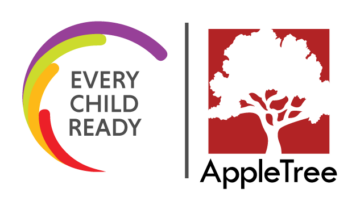


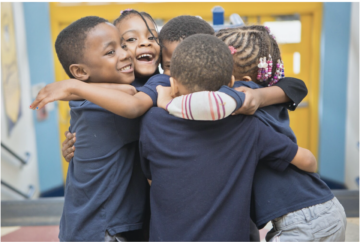 Structured Play: This includes any playful guided activities, like puzzles, art, and some STEM exploration.
Structured Play: This includes any playful guided activities, like puzzles, art, and some STEM exploration. 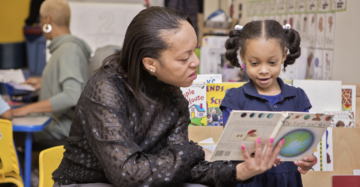 Small Groups:
Small Groups: